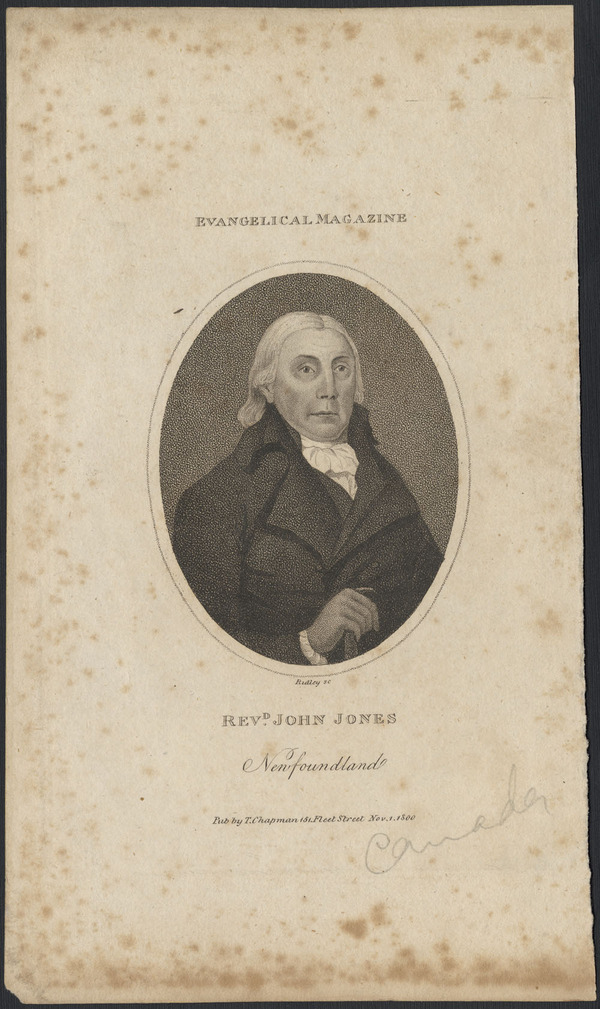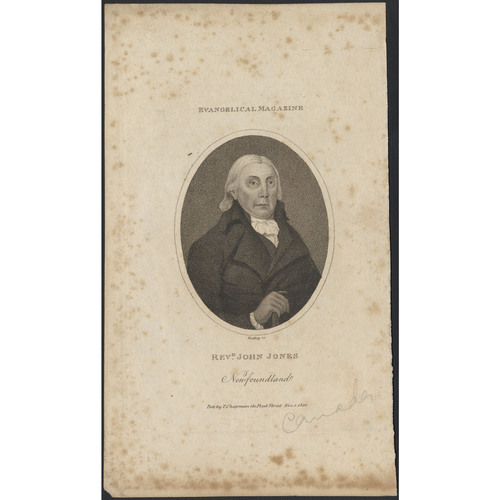JONES, JOHN, soldier and dissenting minister; b. 1737 in Wales of dissenting parents; d. 1 March 1800 at St John’s, Newfoundland.
John Jones joined the Royal Artillery at the age of 20. According to his biographer, “The Ox never drank water more greedily than he drank iniquity,” and his conduct grew worse after his company’s transfer to St John’s in 1765. Even allowing for some exaggeration, it is evident that Jones’s behaviour was no example of Christian probity.
In 1770 he was converted, apparently as a result of hearing a soldier curse God before he died from injuries received in a brawl, and the conversion became permanent, partly because of the encouragement Jones obtained from Laurence Coughlan, whom he met in 1771 and with whom he subsequently corresponded. After his company’s return to England in 1773 he joined a congregation influenced by the ideas of the dissenting preacher George Whitefield. Two years later, by then sergeant-major, quartermaster, paymaster, and clerk of his company, he returned with his unit to St John’s and became a regular attendant at the Church of England services conducted by Edward Langman, the only legal form of worship on the island. At the same time, however, he organized a dissenting society, which at first included a jailer, a sergeant and his wife, and three other soldiers. During the winter of 1775–76 he received permission from local officials to hold services in the court house, but he was almost immediately opposed by Langman. The following summer Langman succeeded in convincing Governor John Montagu to enforce the English law against dissenters and to forbid the rental of accommodation for dissenting services; Jones’s society was forced to meet secretly on the “Barrens” outside St John’s until Montagu’s departure at the end of the fishing season. In the governor’s absence two members of Jones’s society erected a meeting house, which Montagu closed on his return the next year. He threatened to demolish the building and transfer Jones to Placentia, but did not, perhaps because Jones was a good soldier and received the support of his commanding officer.
Jones returned to England in the summer of 1778. Shortly afterwards his society requested him to leave the army and return to St John’s as their minister. He was ordained by a dissenting clergyman and arrived in St John’s in July 1779. One of his first acts was to petition Governor Richard Edwards for permission to preach, but his first petition and a further appeal were refused. Langman’s influence on the governor was, however, counteracted by more favourable opinions from London and these, combined with a recommendation from the chief engineer Robert Pringle, made Edwards respond to a third petition in 1780 by allowing Jones to preach. The meeting house was reopened on 1 August; four years later Governor John Campbell issued a proclamation granting full liberty of conscience and freedom of worship in Newfoundland.
The society encountered financial difficulties from its foundation, but Jones managed to organize a school and contributed from his army pension to help pay for an assistant master and defray the fees of poorer children. In 1790 funds from London eased the situation and enabled him to establish a charity school for all denominations. A new meeting house was completed in 1789, and by 1794 Jones had a congregation of 400 persons. He maintained cordial relations with Methodists, Presbyterians, and Roman Catholics, and lived to see an end to the old feud with members of the Church of England, who used his meeting house in the winter of 1799 while their new church was being built. Jones suffered a stroke in that year and died, appropriately, on St David’s day, 1800; the funeral oration was given by John Harries*, the Church of England minister. In his will Jones bequeathed everything to his charity school. He was never married.
St David’s Presbyterian Church (St John’s, Nfld.), Journal of John Jones. “The life of the Rev. John Jones, late of St. John’s, Newfoundland,” Evangelical Magazine (London), VIII (1800), 441–49. J. S. Armour, “John Jones and the early dissenter movement in Newfoundland” (paper presented to the Nfld. Hist. Soc., St John’s, 17 Nov. 1975). St David’s Presbyterian Church, The dissenting Church of Christ at St. John’s, 1775–1975 . . . (St John’s, 1975). Prowse, History of Nfld. (1895), supp., 49–51. J. R. Thoms, “Twenty-six notable men,” The book of Newfoundland, ed. J. R. Smallwood (6v., St John’s, 1937–75), VI, 177–78.
Cite This Article
Frederic F. Thompson, “JONES, JOHN (1737-1800),” in Dictionary of Canadian Biography, vol. 4, University of Toronto/Université Laval, 2003–, accessed December 31, 2025, https://www.biographi.ca/en/bio/jones_john_1737_1800_4E.html.
The citation above shows the format for footnotes and endnotes according to the Chicago manual of style (16th edition). Information to be used in other citation formats:
| Permalink: | https://www.biographi.ca/en/bio/jones_john_1737_1800_4E.html |
| Author of Article: | Frederic F. Thompson |
| Title of Article: | JONES, JOHN (1737-1800) |
| Publication Name: | Dictionary of Canadian Biography, vol. 4 |
| Publisher: | University of Toronto/Université Laval |
| Year of publication: | 1979 |
| Year of revision: | 1979 |
| Access Date: | December 31, 2025 |




